Quantum Leap: How Recent Developments Are Shaping the Future of Computing

As we stand on the precipice of a new era in technology, the field of quantum computing is starting to capture the imagination of researchers, industries, and policymakers alike. This transformative technology promises to revolutionize various sectors by solving complex problems that are currently infeasible for classical computers. Recent developments in quantum mechanics, coupled with advances in engineering and materials science, are propelling us toward a future where quantum computing becomes mainstream.
Understanding Quantum Computing
At its core, quantum computing leverages the principles of quantum mechanics to process information in fundamentally different ways than classical computers. Classical computers use bits as the basic unit of information, where each bit is either a 0 or a 1. Quantum computers, however, use qubits, which can exist in multiple states simultaneously thanks to a property known as superposition. Moreover, qubits can be entangled, allowing for a unique interconnectedness that classical bits cannot achieve.
This enables quantum computers to perform many calculations at once, dramatically increasing their processing power for specific tasks. While classical computers excel in general-purpose tasks and everyday applications, quantum computers are uniquely suited for applications involving vast amounts of data, complex simulations, cryptography, optimization problems, and more.
Key Developments in Quantum Computing
-
Hardware Innovations: Recent advancements in quantum hardware have been impressive. Companies such as IBM, Google, and Rigetti Computing are designing and manufacturing superconducting qubits—one of the most promising approaches to building quantum processors. New materials and fabrication techniques are also enhancing qubit stability and coherence times, which are vital for effective quantum computation.
-
Quantum Algorithms: The development of quantum algorithms is crucial for unlocking the full potential of quantum computers. Notable algorithms like Shor’s algorithm for factoring large numbers and Grover’s algorithm for database search have demonstrated exponential speedups over classical algorithms. As researchers create more efficient algorithms, the range of problems solvable by quantum computers expands significantly.
-
Error Correction and Noise Reduction: One of the major challenges in quantum computing is the susceptibility of qubits to noise and decoherence. Breakthroughs in quantum error correction codes are paving the way for more reliable quantum computations. Techniques such as surface codes and topological qubits aim to mitigate errors and extend coherence times, making quantum computers more practical for real-world applications.
-
Remote Quantum Computing: Quantum computing is becoming increasingly accessible through advancements in cloud-based quantum computing services. Companies like Amazon, Microsoft, and IBM provide platforms for researchers and businesses to experiment with quantum algorithms without needing a quantum computer on-site. This democratization of quantum resources accelerates innovation and collaboration across industries.
- Commercialization Efforts: Quantum technology is beginning to transition from research labs into commercial applications. Startups and established firms are exploring use cases in areas like drug discovery, materials science, optimization, and finance. Investment in quantum ventures is surging, with venture capital flowing into companies that are developing quantum hardware, software, and applications.
Implications for Industries
The implications of quantum computing span a range of industries. For pharmaceuticals, quantum computing could significantly reduce the time required to simulate molecular interactions, thus speeding up drug development and lowering costs. In finance, quantum algorithms could optimize trading strategies and risk assessments, leading to enhanced profitability. Additionally, industries reliant on logistics and supply chain optimization stand to benefit immensely from solving complex routing and scheduling problems more efficiently.
However, the rise of quantum computing also poses challenges, particularly in the realm of cybersecurity. Quantum computers have the potential to break traditional encryption methods, which raises significant concerns for data security. This has prompted researchers and organizations to invest in post-quantum cryptography to develop new encryption standards that can withstand quantum attacks.
The Road Ahead
As the field of quantum computing continues to mature, we are likely to witness an acceleration in commercialization efforts and practical applications. The next few years will be pivotal as researchers tackle the remaining technical challenges, including scalability, error rates, and environmental stability. While it may still be some time before quantum computers achieve full parity with classical systems for general use, the strides being made today are laying a robust foundation for a future where quantum computing plays an integral role in solving some of the world’s most pressing problems.
In conclusion, we are on the brink of a quantum leap in computing that has the potential to reshape industries, enhance our understanding of complex systems, and drive unprecedented innovation. With each development, we get closer to realizing a world where quantum computing enriches our lives, making what once seemed impossible an everyday reality. As we embrace this new frontier, it is essential to navigate the associated challenges responsibly, ensuring that the advancements in technology serve the greater good and contribute to a sustainable future.













